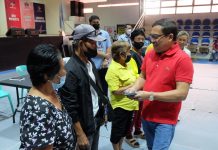Clean potable water is a basic human need, given its scarcity in the upland areas of Marilog district, Davao City. Data from the Philippine Department of Health reveal that children aged five and below are most vulnerable to waterborne diseases as a result of contaminated water and poor sanitation. Therefore, it is imperative to find a renewable source that is not only affordable but also easy for the local community to sustain.
Inadequacy of water
The Kibangay Elementary School, Barangay Malamba, Marilog district in Davao City is approximately 1.5 kilometers from the Davao-Bukidnon Hignway and is 50 kilometers from Davao City’s central district. The school sits on top of a hill and is isolated from the cluster of households downhill. Before the implementation of the project, the 280 students of the school fetched water from a spring downhill, a physical task that eats up the students’ time to study and play.
Aside from the inadequate supply of water, only one of the two existing crude cisterns in the shoal is functional and the latrines in most of the classrooms are seldom used. Because of this, school children are forced to relieve themselves behind trees and bushes around the school premises, a practice that raises concern over contamination spread of diseases.
Addressing the problem
To address the problem Kibangay Elementary School, the Coca-Cola Foundation (CCF) and the Alliance for Mindanao and Multi-Regional Renewable/Rural Energy Development (AMORE 3) created a program for safe water and sanitation utilizing a rainwater harvesting facility.
The latest in a string of community water access programs, the Kibangay Elementary School facility can process rainwater through ferrous cement filtration technology coupled with chlorination capable of storing up to 6,000 liters of clean potable water. All added, the programs provide clean water for over 2,275 households and 15,000 students through rainwater harvesting systems in Pavia, Iloilo; San Jose, Romblon; Carlos P. Garcia, Bohol; Pangapuyan Island, Zamboanga; Kapangan, Benguet; Mandaue City, Cebu, as well as in 20 Gawad Kalinga villages nationwide in Luzon, the Visayas, and Mindanao.
Simultaneously, with each of the programs mentioned above, the CCF and AMORE 3 also implemented an education and awareness program with the involved communities to ensure the sustainability of the projects and enable environmental awareness.
The project also enlists the active engagement of various stakeholders, such as the barangal local government unit; Barangay Water and Sanitation Association (BAWASA); parents, teachers and community association; the barangay local government unit (MLGU); and the local Department of Education (DepEd).






